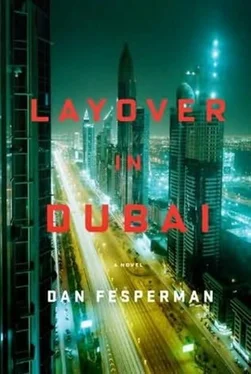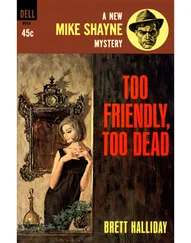“Okay.” Demure voice, ceding ground she knew she couldn’t hold.
“Or maybe fifteen minutes would be better, because I can see now that it is going to be necessary for me to tell you a very old story. And to hear it you’re going to have to take this next exit, because I won’t tell it while you’re driving.”
She looked over at her father as if not quite believing him.
“Well, do you want to hear it or not?”
She took the exit, the one for Emirates Mall.
“Pull into the parking deck,” Sharaf said. “A lower level, where we’ll be out of sight.”
She circled downward and squeezed into a space between two other BMWs. They sat in silence for a few seconds while the color of Sharaf’s neck continued to fade down the spectrum. He turned toward Sam.
“This is a private story about my family. I am afraid I must tell it in Arabic so that only Laleh will understand it.”
“Sure. Okay.”
“No,” Laleh said, employing her new favorite word. Sam figured she hadn’t used it this much since the age of two. He braced for Sharaf’s next explosion.
But the older man contained himself. Maybe he realized he was dealing with a strange new phenomenon of defiance, a force of nature every bit as unstoppable as a sandstorm, or a plague of locusts. Whatever the reason, he asked his next question in English, and in a tone that was calm and reasonable, if somewhat puzzled.
“Why do you say ‘No’ to me now, my daughter? Are you overly tired? Or is it because, as all of those ridiculous Western television programs designed for ladies like to say, that you are suddenly feeling ‘empowered’?”
Laleh seemed to hold back a grin.
“My reason is more practical. If you really are about to explain why you can’t possibly turn back, then doesn’t Mr. Keller deserve to hear it as well? Now that your destinies are shared.”
Sharaf considered her words a moment, then nodded, apparently relieved to find himself back in territory where he at least understood the logic.
“A valid point. Very well, then. If Mr. Keller has the patience, then he, too, may hear the story of our family’s disgrace.”
“Disgrace?” Her resolve seemed to waver.
“Yes. ‘Disgrace’ is exactly the right word, as you will see. It is the foundation upon which our wealth has always been based. Do you still wish for a stranger to learn why?”
There was a pause, followed by a small nod and a very quiet “yes.”
“Then I will tell you. It is the very reason I became a policeman, or more to the point, an honest policeman.”
“It wasn’t because of that television show, Percy Mason?”
“No, my dear. And it’s Perry, not Percy. Although that story is real enough. I really did feel like a shining knight of justice whenever I translated his triumphs for our neighbors. But that came later, when I had tutors and was learning English. By then my father could afford to pay for such things. The real reason came earlier, when I was twelve. It was summer, the year before Ali and I would put to sea. My family was not really poor, no more than anyone else. But our house was not as grand as it would become, and our pleasures were simple. One of mine was that on the night of every full moon I enjoyed sneaking down to the banks of the creek, because that was when the women and girls liked to swim. They went into the water in their dresses, of course, even after dark. But, well, you know what water does to dresses. It was the only way a boy of twelve could ever expect to see such things.”
“I’m shocked,” Laleh said. She was joking, but Sharaf hadn’t even noticed. From his eyes Sam could see he was swept away on a current from his past.
“So there I was, lying in the reeds, swatting at mosquitoes and trying not to make noise, not that I had to worry about that because the girls were laughing so loud. Then I heard footsteps coming up on the path behind me. I froze. I was sure it was the father of one of those girls, who would swat my head and turn me over to an imam on Friday for a lesson in proper behavior.
“But no. Nothing like that. It was my own father, and he wasn’t looking for me. Even in the moonlight you could see right away by the glitter of his eyes that he was a man on important business. Maybe that was why I decided to follow him. To see what was afoot.”
“So even then you were a detective,” Laleh said.
“Or maybe I just didn’t trust him. I never had. He was always trying to swindle someone in the souk, or cheat a boat captain out of his cut. So I moved out of the reeds and tucked in behind him, walking as quietly as I could. He went a few hundred yards more until he stopped at a small walled lot behind the house that belonged to his brother, Abdullah. That seemed especially odd, because Uncle Abdullah had died only a week earlier, and the family was still in mourning. He climbed over the mud wall and moved toward a palm tree in the middle of the lot. Then he turned to face the creek-I had to duck behind the wall-and he took several careful steps straight toward me before stopping. He then turned directly to his right and made five more strides, counting them as he moved. Then he stopped again.
“I saw then that he was carrying something, one of those small folding shovels like the British soldiers used to have. He must have picked it up surplus, or maybe he stole it off one of their trucks. But he began to dig, right there by the light of the moon, and in only a minute or two he struck something. It sounded like metal hitting a clay pot, and at that moment I knew what he was doing, and what he had found, and I was scandalized.”
“What was it?” Laleh said.
Sam, just as eager to find out, leaned forward from the backseat.
“Well, in those days, especially if you made your money from pearling, no one ever put their money into banks. You collected your savings in old silver coins called Maria Theresas. You’d put them into a big clay pot, stopper the top, and bury it somewhere handy, in a secret place that only you knew. And this pot my father had dug up must have belonged to Uncle Abdullah, because I had heard his wife at the funeral only days earlier, complaining to the other women that her husband had died before telling anyone where their fortune was buried. It wasn’t an uncommon occurrence then, especially when men were lost at sea. Their families were left with nothing unless someone could find the pot. But apparently my father, whether by sneaking around, or threats, or whatever means, had known the location all along. And he had waited until the first full moon to go and dig it up.
“There must have been a lot of coins, because the pot was very heavy. He could barely carry it, especially with the little shovel tucked beneath his arm. But he made it home without anyone seeing him, and when he reached our garden he dumped the contents into a sack. He broke the pot into little pieces and took them out to the creek, where he scattered them on the water. Then he made a fire and put the coins into a cooking pot with water and dried lemons. People did that to remove the tarnish, because the dampness underground always made the coins turn green.
“The following week my father bought three new boats to add to the one small pearling boat he already owned. Then he bought new engines for all four. That summer he needed so many new crewmen that he had to put me to work, and he hired the two older boys who became my friends, Ali and Mansour. Two of the new boats were even seaworthy enough to make the crossing to India, so he was also able to enter the gold-smuggling trade as well, once the pearling season was over. It made his fortune. And of course his wealth was then passed down to me, and, in turn, to you and your brothers. All of it accomplished by an act of theft against his own brother’s family.
Читать дальше












